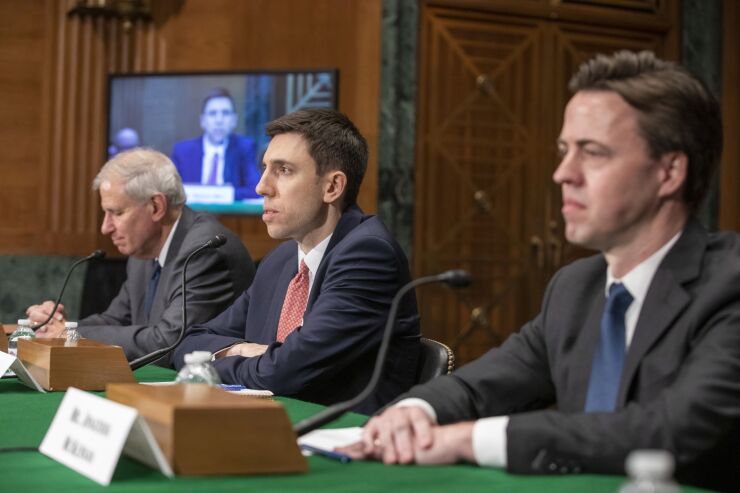Last week Martin Gruenberg, the
While Gruenberg wasn't the only nominee at the hearing, he fielded most of the attention and handled it
LUMMIS: I want to turn next to Dodd-Frank.

GRUENBERG: I have not worked for a state banking agency, Senator.
LUMMIS: Have you ever written a report of examination or issued an exam rating to a community bank, the things that would give you a good understanding of how fair a bank's exam rate is, for example?
GRUENBERG: Well, I would point out that the FDIC supervises, as you know, state-chartered institutions …
LUMMIS: Have you ever written a report of examination?
GRUENBERG: No, I'm not an examiner. I've just served on the board of the agency.
LUMMIS: Do you think someone should have been nominated to the FDIC board with state bank supervisory experience? Because most banks in our dual banking system are state-chartered.
GRUENBERG: They are the majority of the institutions. I understand why you ask the question, Senator, and in a sense … that's also above my pay grade. It's a judgment for the White House in terms of the nominations.
LUMMIS: Well, the statute requires that someone who has actually served as a state bank regulator. That's not you, or any other nominee here. So I think it's pretty clear that the White House and this committee think it's OK to ignore the clear text of Dodd-Frank, and I don't think this committee should move forward with these nominations until we start following the law.
Lummis's line of argument seems pretty cut and dried —
The requirement that the FDIC board include one member with state supervisory experience dates back to the go-go '90s, when Congress was actively tinkering with bank regulatory statutes in the wake of the savings and loan crisis of the 1980s. As Jim Cooper, president and CEO of the Conference of State Bank Supervisors, recently
In other words, there is value in having someone who knows the state side of the bank supervisory ball in the room when the FDIC is crafting rules. And it's worth noting that these kinds of requirements are all over the financial regulatory apparatus: The FDIC, Securities and Exchange Commission and Commodity Futures Trading Commission (among others) require that their governing boards include a stated number of members of another party than that of the president nominating them — known as minority-party members.
The Federal Reserve has a requirement similar to the FDIC's that requires "at least one member with demonstrated primary experience working in or supervising community banks having less than $10,000,000,000 in total assets" — a role currently filled by Gov. Michelle Bowman but that was
I'm not trying to dunk on the reasoning behind these statutory requirements. The reason they are there is that there is real value in having rules crafted by a group of people who see things differently or at least from different perspectives and experiences. It is a measure to prevent "

Lummis — and the
And to put a finer point on it, the FDIC has not brought on a new director with state supervisory experience since Tom Curry, who had been commissioner of banks in Massachusetts, joined the board in 2004. He stayed on until 2017, including five years when he also served as comptroller of the currency.
This is the heart of the problem with these statutory requirements about who can be in the regulatory room: The only effective way to enforce them is through the nomination process, which renders it a political rather than a legal question. I'm not a lawyer, but I did stay in a Holiday Inn Express last night, and I struggle to envision who could credibly establish standing to argue that the confirmation of this slate of candidates caused me personal demonstrable harm that entitles them to redress because none of these nominees have state supervisory experience. So you get what you get and you don't get upset.
I for one think these kinds of requirements have value, but they work the best when they involve passive triggers. For example, the Federal Reserve Act requires that no regional Fed bank president may serve past the age of 65 unless he or she is nominated after the age of 55, and in that case a president may serve for two terms or until the age of 75, whichever comes first. That provision prevents the scenario where someone can be Fed president for life, and the presidents of the Chicago and Kansas City Fed banks
If Congress has decided that it wants certain kinds of people to be in public offices, it has the right to make those decisions — and it has. But these legislative clauses aren't worth very much if they can be so easily sidestepped. Better to either give them some teeth or take them off the books altogether.





